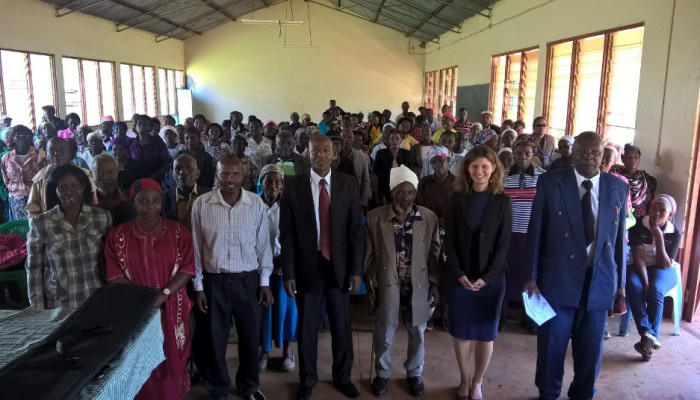
Financial Literacy is important for raising awareness, developing knowledge, skills, attitude and behavior necessary to make sound financial decisions for financial wellbeing of individuals and their families. Even though financial inclusion in Kenya has improved significantly over the years, it is reported that in some regions, it is still as low as around 50%. It is for the latter reason that the Financial Sector Technical Assistance Program of the European Investment Bank (EIB) in East Africa decided to support a pilot financial literacy campaign in Kenya’s Kandara district. Since 2014 AFC, together with its partners ADG and Integration, has been implementing the Technical Assistance from its Nairobi office and has trained more than 8000 people in Kenya, Tanzania, Uganda and Rwanda so far.
Apart from providing training and capacity building measures to improve the quality of the Kenyan banking sector, the Financial Literacy campaign aims at deepening knowledge of rural communities in savings and budgeting lifestyles, banking services and consumer protection principles and thereby enable them to increase their economic participation.
On 7th November, 2016 the financial literacy campaign was officially launched in Kandara district in a festive ceremony that was attended by the County Chief, village leaders, project representatives (AFC team Nairobi) and about 250 individuals, representing different economic self-help groups. For a period of 2 months, the economic self-help groups (e.g. women’s groups engaged in dairy farming) will receive financial literacy training through two trained facilitators in the local Kikuyu language. The interactive sessions are held within the villages and follow the curriculum of the renowned Global Financial Education Program (GFEP), addressing the communities’ needs to access diverse alternative financing options, and allowing them to plan and develop sustainable budget.
During the inauguration event, the consulting team made presentation on the overall program, and provided clarifications to the participants on questions raised. Overall, the participants were excited about the prospect of learning and being part of an international program. Generally, the main challenge facing the participants is their low motivation to save money on a regular basis, as their lives are at subsistence level and can hardly put any money aside. For this reason, the campaign entails a competition component, in which the participants will be encouraged to save small amounts in their individual piggy banks, which they receive during the training opening. This is envisaged will serve as an incentive to save and introduce a routine that can lead to behavior change in the long-run. At the end of the two-months training period, the piggy banks will be opened and the self-help groups, who managed to raise the largest amount of savings will be rewarded with a prize in a closing ceremony.
Moreover, the campaign is also expected to help improve bankability of the rural trained communities. The fears and prejudice against the banking sector are widespread and often difficult to overcome, as they are deeply manifested within the people’s mindsets.
With the spread of mobile money and banking in Kenya, the number of financially excluded people in many rural regions could be further reduced, as it is now much easier for people in rural areas to access banking services through their mobile phones. The financial literacy campaign is a timely opportunity to further educate the rural community groups on how to access different banking services through mobile money platforms and they will be advised on how to find financial products suitable for their needs.
For further information please contact Mareike.decker [at] afci.de
